This piece is part of a series remembering the life, career, and legacy of Helmut (Hal) Sonnenfeldt — a member of the National Security Council, counselor at the Department of State, scholar at the Johns Hopkins School of Advanced International Studies (SAIS), and Brookings expert.
Hal Sonnenfeldt was a tough, direct, exceedingly knowledgeable professor whose classes students wanted to attend. But in 1961, it wasn’t easy to get into his Soviet foreign policy class at the Johns Hopkins School of Advanced International Studies (SAIS).
Students were first expected to take his earlier course on the domestic Soviet Union, which I wasn’t able to do. So, I went to speak with him, to explain that I had taken a comparable course at Barnard that prepared me for his class. But he shook his head and said no. I told him how hard I would work, that I was a good student, that I would catch up and he would see I would do fine, but again he said no. Having been a college debater, I continued: I said I was concentrating on Soviet studies, was enrolled in the only other course on the Soviet Union — Soviet foreign economic policy, and that his class complemented that one and was essential to my studies. “Absolutely essential,” I said, and didn’t move to leave his office.
At that point, he stared at me rather intently and paused. “Ok,” he said, “you can be in the class, but there is one condition: You will have to give the first lecture and it will be on the organization of Soviet foreign policy.” Well, I tried hard not to gasp. After all, he and I both knew that I had probably never given a lecture to a grad school class, that I knew nothing about the organization of Soviet foreign policy, and that finding the information during inter-session would be difficult. There was no internet at that time, and I had planned like other students to return home for rest, friends, and family. But there was no way I could back down. Thinking “oh my god” to myself, I responded: “Ok, sure, I’ll give the lecture,” and remember that he looked a little bit like the cat that had swallowed the canary.
When the class began, I can’t remember how he explained why I was giving the lecture, but I do remember he kept interrupting me with questions to which I didn’t always know the answers. And in subsequent classes, he kept me on my toes by calling out “Cohen” (seemed to me more than other students’ names) when he wanted an analysis of statements made by Soviet officials. His no-nonsense behavior was unnerving, but I felt I was learning more in his class than anywhere else.
It was the height of the Cold War, and during the day Hal Sonnenfeldt worked at the State Department as a lead Soviet expert, analyzing what the Soviet Union was saying and doing, as well as directing research in this strategic area. So, when he posed questions, they were not academic exercises but real-time issues the U.S. government faced.
He made us pore over long Soviet tracts looking for some clue or turn of phrase that might mean a change in policy. He mercilessly went over every paper he assigned as if we were on his staff at State or the National Security Council. I donned a thinking cap in his class because I felt he demanded it, and ended up with an A-.
Looking back, I realize that I benefitted not only from the analytical skills he taught us and how to think and articulate quickly — I benefitted from the way he behaved. He clearly believed in equality between men and women. He took women seriously, holding them to the same standard he held the men in the class. There was, in fact, only a handful of women in the class and in the entire school, and jokes abounded about their seeking an Mrs. degree. He was not of that mold.
I recently asked an Italian Fulbright scholar in the class, Mario Sica, with whom I remain in contact, whether he remembered Professor Sonnenfeldt. Now a retired Italian ambassador, Sica wrote back immediately that he remembered him well. In fact, during the Gorbachev years, Sonnenfeldt passed through Moscow, where Sica was stationed as a diplomat. When Sica recalled to him the SAIS class, Sonnenfeldt shot back in the way only he could: “Did we, or did we not, make a Soviet expert of you?”
Like Mario, I did not see Sonnenfeldt again until some 30 years later, when I was invited to join the Brookings Institution in the 1990s, where Hal was a guest scholar. By this time, I was a specialist in human rights and humanitarian issues, including 1970s involvement with the Soviet dissident movement and Andrei Sakharov. When I reminded him of the 1961 class and described the difficult experience I had, he smiled, and then as if no time had passed, resumed his role as critic and mentor, questioning me about my work on displaced populations, and challenging things I wrote. Once, after speaking on a panel on Iraq in Brookings’s Falk Auditorium, he came over to tell me what he agreed with and what he didn’t, and he challenged me to respond to questions on the U.N.’s role, about which he was skeptical. At times, we were on opposite sides of issues — he having been engaged with Henry Kissinger’s thinking, I having served in the Carter administration on human rights.
Nonetheless, I found that my work on refugees and internally displaced persons (IDPs) resonated with him personally because he was a refugee from Nazi Germany whose family, like so many others, tried to flee persecution. Both his parents, who were doctors, applied for visas to the U.S. as early as 1935, but American authorities did not grant their visas until 1940. In 1938, a few days before Hal’s 12th birthday and eight weeks before Kristallnacht, his mother managed to take him and his brother out of Germany to England and enroll them in a special boarding school. She then returned to Germany to rejoin her husband, and Hal did not see them again until 1944 upon his arrival in the U.S.
The profound trauma of his youth of course deepened his understanding of flight from one’s country, asylum abroad, family separations, and the challenges of resettlement. He could not, therefore, have been more sensitive to the work I was doing on IDPs, those forcibly uprooted within the borders of their own country by violence, human rights violations, and disasters. I explained that the international refugee system set up after World War II to protect those who crossed borders did not extend to IDPs. I told Hal about the persons I had seen uprooted by conflict and starvation in Ethiopia in the 1980s, who had no predictable international system to turn to and who had sparked my interest. He liked being kept informed on the issues concerning sovereignty, the development of international standards, and the expansion of institutional arrangements. He followed the work I was doing with Brookings scholar Francis Deng, representative of the U.N. Secretary-General on IDPs, and a team of international lawyers to formulate principles for IDPs and secure the adoption of Guiding Principles by the international community.
Soon, he was introducing me proudly as his former student and I soon was introducing him proudly as my former professor. Even when I walked onto a crowded elevator at Brookings, he would say: “That’s my former student.” And when I won an award for my work on internal displacement, he was the first to congratulate me. And when I got a big one (together with Deng), he told me: “Now you’re going to get other awards because after the first big one, others follow.” That was evidently his experience and he was right. In the corridors at Brookings, he would always ask: “What else did you get?”
In 2007, I retired from Brookings and Hal Sonnenfeldt was present for the entire party. When I became a member of the Brookings Council, to which Hal and his wife Marjorie belonged, we always sought each other out, and if I asked the speaker a question, he would tell me after whether he thought it was a good question.
From an initially challenging and tense exchange in 1961, our relationship grew into one of mutual affection, respect, and fun roles as professor and student. I will always remember Hal’s amusing — even acerbic — wit, his candor, his critical abilities, his incredible encyclopedic knowledge of Soviet and European events, and his warmth all rolled into one. He remains in my memory as a rich part of my educational and professional development.
The Brookings Institution is committed to quality, independence, and impact.
We are supported by a diverse array of funders. In line with our values and policies, each Brookings publication represents the sole views of its author(s).


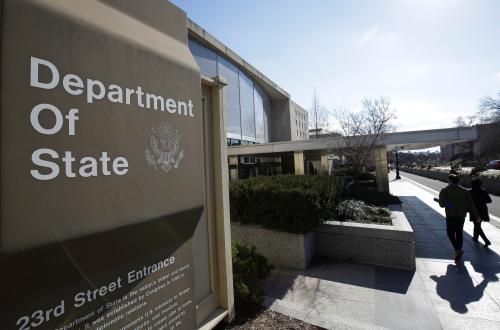
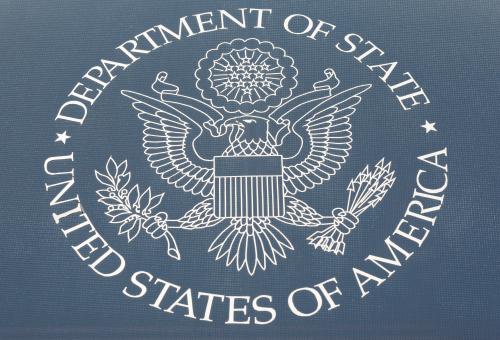
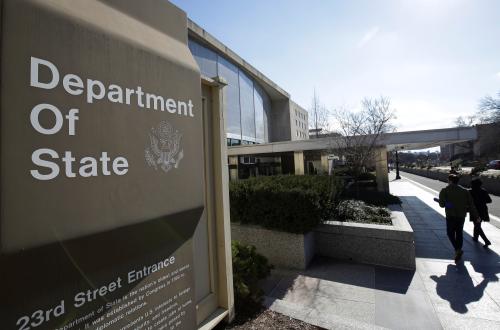
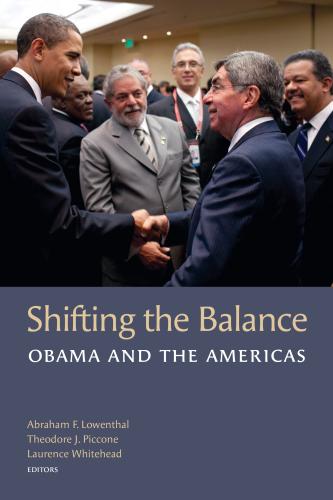
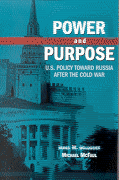
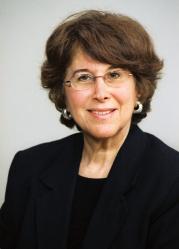



Commentary
A homage to my Brookings colleague and former professor Hal Sonnenfeldt
October 17, 2019